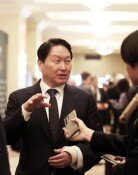[Editorial] Productive Debate Over Amendment
[Editorial] Productive Debate Over Amendment
Posted September. 01, 2009 07:48,
The Constitution Research Advisory Committee under the National Assembly speaker yesterday announced its final report on its study of constitutional amendment, including multiple methods to revise the power structure. The double executive government system involves reducing the presidents power and drastically boosting that of the prime minister. Under this system, the prime minister would be elected by parliament to head the executive branch in controlling national security, economic policy and national defense. The president would hold authority over the military, overseas troop dispatch, submission of treaties for ratification, recommendation for the dissolution of parliament, submission of bills and submission and enactment of laws and executive orders, and the formation of the Cabinet. The double-term system of a president and vice president system would remove the governments right to submit bills and expand the National Assemblys power, including the right to set the national budget.
The advisory committee also proposed a bicameral system and the perennial National Assembly system, as well as transfer of the authority to audit state budget implementation from among the Board of Audit and Inspections right to audit and inspect civil servants. All of these are matters could greatly impact the administration and daily life. The debate over constitutional amendment began when National Assembly Speaker Kim Hyong-o officially proposed it in his congratulatory speech on Constitution Day July 17. President Lee Myung-bak also indirectly suggested an amendment in his Liberation Day speech Aug. 15, when he proposed a revision to the electoral constituency system and a reshuffle of the administrative district system.
While the 1987 constitutional amendment focused on preventing a prolonged seizure of power, it could be time for Korea to consider upgrading the Constitution to pursue a vision for an advanced nation. The country has ample experience of a peaceful transfer of power. The question, however, is if the ruling and opposition parties are mature enough in their stances to hold future-oriented discussions over constitutional amendment with an open mind to ensure national interest and public benefits. Ill-advised practices prevail at the National Assembly, as lawmakers often disregard the Constitution and the National Assembly Act and use violence to bring parliamentary schedules to a halt.
The advisory committee said, It is desirable to conclude procedures for a constitutional amendment before the local elections in June next year, a point in time when discussions over constitutional amendment will continue to not be swayed by political interests. It advised the establishment of a body such as a special committee on constitutional amendment at the National Assembly. The floor leader of the main opposition Democratic Party, Lee Kang-rae, said, however, Debate over constitutional amendment at present is analogous to a situation where the president commands at the back, the National Assembly implements, and the ruling Grand National Partys floor leader pushes, questioning the motive of the ruling camp for putting the issue up for debate. Thus, the Democratic Party showed distrust, noting that its rival seeks to use the constitutional amendment debate only to shift the tide for the October by-elections and next years local elections. The Democratic Party says it will inherit the spirit of the late former President Roh Moo-hyun, but is avoiding debate over a constitutional amendment during the 18th National Assembly, which the party promised Roh in 2005, by making an excuse with the Grand National Party.
If the National Assembly fails to recover basic trust between different parties and factions and fails to change into a body of national representatives, it will be difficult to expect seamless debate over constitutional amendment, an issue more complicated than any pending bill.







